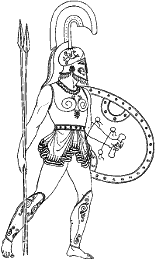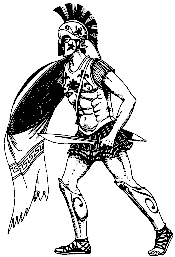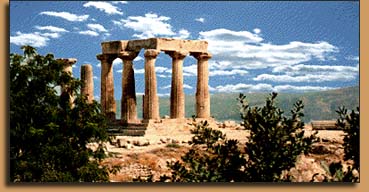Unit One Section E


 |
 |
Sappho was one of the few women writers of ancient Greece. All that remains of her writing are fragments of her poems. How do they reveal her personal view of life? 1) stars around the beautiful moon 2) it is not for me, it seems, 3) .....like the sweet-apple 4) To have beauty is to have only that, |
1. What happens to the stars when the full moon shines? |
Sophocies wrote several plays about Oedipus, the man who solved the riddle of the Sphinx. The epigrams below were taken from those plays. Which ones do you agree with? None love the messenger who brings bad news. from Antigone For money you would sell your soul. from Antigone
A man of worth
One must learn |
1. Do you think the first epigram is true? Why would a messenger be blamed for bad news? |
Euripides wrote plays about what happened to Agamemnon's family after the Trojan War. The epigrams below come from several sources. Which epigrams contain the most useful advice for your life? A bad beginning makes a bad ending. from Aegeus Waste not fresh tears over old griefs. from Alexander The gods visit the sins of the fathers upon the children. from Phrixus In case of dissension, never dare to judge Leave no stone unturned. from Heracleidae Time will reveal everything. It is a babbler, |
1. According to the first epigram, why is it important to begin a project well? |
Agathias wrote a great deal about dating and his own courtship. In the dialogue that follows, what statement is Agathias making about love? A. Why that alarming sigh? B. I'm in love with a girl. A. Attractive? B. I think so! A. Where did you meet her? B. Last night at a dinner party. A. I see. And you think you've a chance with her? B. I'm sure of it; but It's got to be kept a secret, friend. A. Ah. Then you mean That you are not contemplating Holy Matrimony? B. That isn't it. I mean That I've learned she hasn't a penny in the world. A. You've 'learned'! - Liar, liar, you're not in love! The heart struck silly by Love's shaft Forgets its arithmetic! |
1. What is speaker B's situation? |
 |
Ovid, a Roman poet, retold many classical myths in a series of books called Metamorphoses. In the following myth, lovers try to overcome the obstacles that separate them. Are they successful?
Next door to each other, in the brick-walled city Came, and the fires of night burnt out, and sunshine Dried the night frost, and Pyramus and Thisbe Met at the usual place, and first, in whispers, Complained, and came--high time!--to a decision. That night, when all was quiet, they would fool Their guardians, or try to, come outdoors, Run away from home, and even leave the city. And, not to miss each other, as they wandered In the wide fields, where should they meet? At Ninus' Tomb, they supposed, was best; there was a tree there, A mulberry--tree, loaded with snow--white berries, Near a cool spring. The plan was good, the daylight Was very slow in going, but at last The sun went down into the waves, as always, And the night rose, as always, from those waters. And Thisbe opened her door, so sly, so cunning, There was no creaking of the hinge, and no one Saw her go through the darkness, and she came, Veiled, to the tomb of Ninus, sat there waiting Under the shadow of the mulberry--tree. Love made her bold. But suddenly, here came something!-- A lioness, her jaws a crimson froth With the blood of cows, fresh--slain, came there for water, And far off through the moonlight Thisbe saw her And ran, all scared, to hide herself in a cave, And dropped her veil as she ran. The lioness, Having quenched her thirst, came back to the woods, and saw The girl's light veil, and mangled it and mouthed it With bloody jaws. Pyramus, coming there Too late, saw tracks in the dust, turned pale, and paler Seeing the bloody veil. "One night," he cried, "Will kill two lovers, and one of them, most surely, Deserved a longer life. It is all my fault, I am the murderer, poor girl; I told you To come here in the night, to all this terror, And was not here before you, to protect you. Come, tear my flesh, devour my guilty body, Come, lions, all of you, whose lairs lie hidden Under this rock! I am acting like a coward, Praying for death." He lifts the veil and takes it Into the shadow of their tree. He kisses The veil he knows so well, his tears run down Into its folds: "Drink my blood too!" he cries, And draws his sword, and plunges it into his body, And, dying, draws it out, warm from the wound. As he lay there on the ground, the spouting blood Leaped high, just as a pipe sends water spurting Through a small hissing opening, when broken With a flaw in the lead, and all the air is sprinkled. The fruit of the tree, from that red spray, turned crimson, And the roots, soaked with the blood, dyed all the berries The same dark hue. Still frightened, but a little fearful, also, To disappoint her lover. She kept looking Not only with her eyes, but all her heart, Eager to tell him of those terrible dangers, About her own escape. She recognized The place, the shape of the tree, but there was something Strange or peculiar in the berries' color. Could this be right? And then she saw a quiver Of limbs on bloody ground, and started backward, Paler than boxwood, shivering, as water Stirs when a little breeze ruffles the surface. It was not long before she knew her lover, And tore her hair, and beat her innocent bosom With her little fists, embraced the well--Ioved body, Filling the wounds with tears, and kissed the lips Cold in his dying. "O my Pyramus," She wept, "What evil fortune takes you from me? Pyramus, answer me! Your dearest Thisbe Is calling you. Pyramus, listen! Lift your head!" He heard the name of Thisbe, and he lifted His eyes, with the weight of death heavy upon them, And saw her face, and closed his eyes. Saw her own veil, and saw the ivory scabbard With no sword in it, and understood. "Poor boy," She said, "So, it was your own hand, Your love, that took your life away. I too Have a brave hand for this one thing, I too Have love enough, and this will give me strength For the last wound. I wfll follow you in death, Be called the cause and comrade of your dying. Death was the only one could keep you from me, Death shall not keep you from me. Wretched parents Of Pyramus and Thisbe, listen to us, Listen to both our prayers, do not begrudge us, Whom death has joined, lying at last together In the same tomb 'And you, 0 tree, now shading The body of one, and very soon to shadow The bodies of two, keep in remembrance always The sign of our death, the dark and mournful color." She spoke, and fitting the sword-point, at her breast, Fell forward on the blade, still warm and reeking With her lover's blood. Her prayers touched the gods, And touched her parents, for the mulberry fruit Still reddens at its ripeness, and the ashes Rest in a common urn. |
1. What barriers keep Pyramus and Thisbe apart? How are they able to talk to each other? |